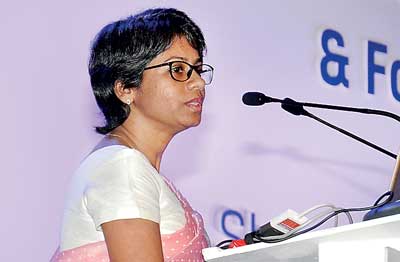Saturday Feb 21, 2026
Saturday Feb 21, 2026
Tuesday, 8 August 2017 00:00 - - {{hitsCtrl.values.hits}}
By Shehana Dain
Amidst the challenging economic condition global research firm Nielsen last week declared optimism for growth in Sri Lankan companies engaged in home improvement and premium Fast Moving Consumer Goods (FMCG) segments.
Gazing into the future Nielson Sri Lanka Managing Director Sharang Pant said that even though consumer confidence has taken a hit with high inflation rates with increased urbanisation in the local landscape, demand for durables, furnishing and telecommunications will emerge as exponential growth stories.
Elaborating on which companies have potential for higher investor returns at the fifth CFA Annual Capital Market Awards ceremony Pant said: “Most of our spend is on FMCG still but look out for areas such as telecommunication, housing and furnishing which includes durables these are the areas other countries in the upper middle income category have started spending. Sri Lanka is on the verge to cross that barrier to get into the higher middle income bracket and the trend which should be expected In Sri Lanka as well. There is no reason why we shouldn’t be seeing this as an opportunity.”
Moreover noting that if focused action is taken now by the FMCG companies they can fill the void in the premium staples and personal care markets as the Sri Lankan consumer evolves from the lower to the higher middle income bracket.
Sri Lanka has a relatively low premium segment penetration which stands at 16% compared to India which has a 30% penetration rate in the premium segment. However this behaviour contradicts the per capita income between the two countries depicts a different story. In 2016 GDP per capita for Sri Lanka stood at $ 3835 while in India it stood at significantly low $ 1709.
According to Pant this behaviour of resistance to move to premium in certain categories primarily in FMCG could be shifted if companies focus on affordable premium as the first step.
Explaining further he said: “We can help the consumer to graduate from its current level to the next level of affordable premium and then finally to the luxury goods. In some sectors like automobiles there are many options but if you ask me about FMCG, which is the biggest spend area for a consumer and there aren’t much options for affordable premium. That’s something the manufactures should look into and investors to look for if there are companies getting into that sector because this sector is bound to grow.”
The firm highlighted the importance of E-commerce as a future prospect of consumerism in the country. However the E-commerce market locally is valued at 0.02 billion compared to staggering 13 billion in India.
Pant highlighted that even though the market size drastically varies the per capita income being in favour to Sri Lanka raises the question why E-commerce isn’t growing in the country while adding that lobbying should be done to strengthen weak payment regulations.
Post the presentation a panel discussion was held with the two speakers and Lahiru Pathmalal, Co-founder and CEO, Takas.lk and Gihan Cooray, Executive Director, John Keells Holdings, moderated by Shalini Kurululasuriya, CFA, sharing useful insights on the rapid growth of third party on-line portals and the challenges in existing payment gateways in the country.
Giving insight on which stocks to cash in the Guardian Fund Management CEO Ruvini Fernando said that the modest but steady growth in staples is ideal for a defensive position in any portfolio.
According to financial data the FMCG (fast moving consumer goods), F&B (food and beverages) segment has shown robust growth in earning and margins. Whilst earnings are vulnerable to fluctuations in commodity prices it has not eroded margins.
“Staples pass on their price increases more to their customers. People are getting more used to premium so some items like Ice-cream soft drinks dairy products processed meats are not fully penetrated. Customers are not very price sensitive and companies are going towards premium food branding,” Fernando told the fifth CFA Annual Capital Market Awards ceremony last week.
Although F&B is the most significant contributor to the per capita expenditure its share is reducing with expansion of income spent on healthcare, transportation and housing increased. Consumer spending is growing but the amount been allocated for essentials has reduced from 46% to 39% over the last decade.
Highlighting other growth opportunities in the consumer sector Fernando also added that there are stocks in areas such as retail and durables that shows promise if invested wisely. According to her the durables market is prone for fluctuations and strongly co-relates with credit to the private sector due to a significant part of it is funded by banks.
This could be a result of durables being a one off purchase thus when there are economic cycles and individual purchasing power comes down the demand for durables can be affected and can be quite volatile. However consumer financing may take a longer horizon as a consumer will continue will have to keep on paying instalments on time. Thus the profitability on the financing side of consumerism is increasing.